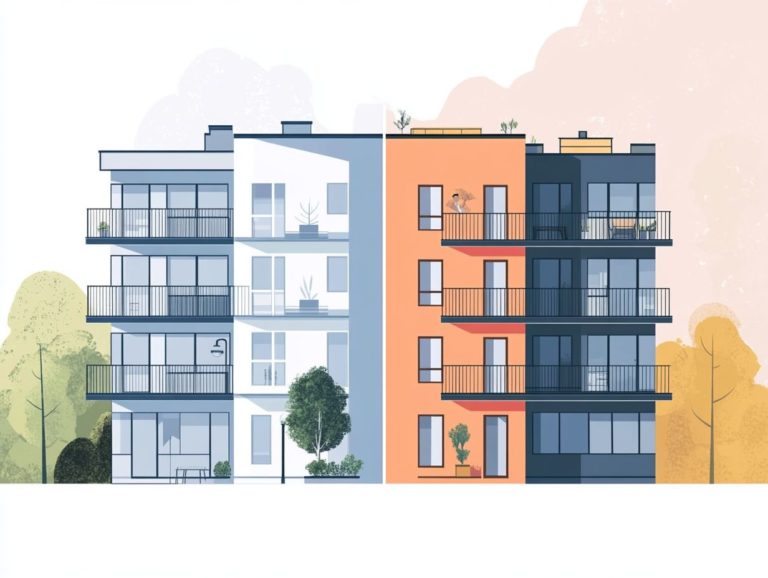Home Insurance for Condos: Key Details
Home Insurance for Condos is crucial for protecting your investment and personal belongings.
Gaining a solid grasp of the basics, including the various types of coverage available, empowers you to make informed decisions.
Considerations such as location, the age of the building, and available amenities play a vital role in shaping your premiums.
This guide delves into how to select the right coverage, clears up common misconceptions, and highlights the intricacies of condo insurance ensuring you have the comprehensive protection you require as a homeowner.
Contents
Key Takeaways:

Condo owners should understand the basics of Home Insurance for Condos, such as what it covers and how it differs from other types of insurance.
Basic coverage may not be enough to protect your condo fully. Consider the location, building age, and amenities when choosing between basic and comprehensive coverage.
Many factors, like coverage level and location, affect your condo insurance cost. Make sure to shop around and compare quotes to get the best deal.
What is Home Insurance for Condos?
Home Insurance for Condos is an insurance policy specifically crafted to safeguard the distinctive elements of condominium living in California. For those looking for the best options, consider exploring the top home insurance providers for condo owners, as it addresses your individual needs as a unit owner and the broader obligations of the condo association.
This insurance covers personal property, liability protection, and damages to your condo unit itself. With such thoughtful coverage, you can rest assured that your insurance meets your ownership responsibilities with precision.
Understanding the Basics
Understanding the fundamentals of condo insurance is crucial for you as a condo owner. It clarifies the necessary insurance documentation, coverage limits, and potential policy exclusions that could affect your personal property and liability protection.
- Personal property coverage protects your belongings within the unit, while liability coverage safeguards you against potential lawsuits stemming from accidents on the premises.
- Mortgage lenders often set specific insurance requirements to protect their investment, which means you need at least basic coverage.
- You must differentiate between master insurance policies, which cover common areas and the building structure, and individual policies that focus on protecting your personal belongings and personal liability. A master policy means coverage for shared areas.
Understanding these distinctions empowers you to make smart decisions about your coverage.
Types of Coverage Available
You have a range of coverage options for condo insurance at your disposal.
Basic coverage provides essential protection against risks such as fire and theft, while comprehensive coverage takes it a step further, encompassing personal injury and loss assessment to safeguard your valuable possessions within your condo unit.
Basic Coverage vs. Comprehensive Coverage
When you assess condo insurance, it s essential to grasp the difference between basic coverage, often called a bare-walls-in policy (which means only the interior of your unit is covered), and comprehensive coverage, known as an all-in policy. The latter provides a more extensive level of protection with higher coverage amounts and broader claims coverage.
Understanding these nuances allows you to recognize the specific protections each policy type offers and how they interact with the condo association’s master policy. Basic coverage typically safeguards the structure from the walls inward, ensuring your personal property and improvements are adequately insured, but it may leave gaps that you ll need to cover.
On the other hand, comprehensive coverage can offer a safety net for both shared property and your personal belongings, helping you navigate potential risks with confidence.
It’s also vital to consider how these coverages impact premium costs. While all-in policies might come with a higher premium, they can provide peace of mind against broader risks, making them a worthy investment for many homeowners.
Factors Affecting Home Insurance for Condos

Numerous factors influence Home Insurance for Condos, including the location of your unit, the age of the building, and the amenities offered.
Each of these elements significantly impacts your insurance requirements and the overall evaluation of coverage needed.
Explore your options now to secure the best protection for your condo!
Location, Building Age, and Amenities
When evaluating home insurance for condos, consider the location in California, the building’s age, and the available amenities. These elements can shape your insurance landscape and influence the advice you get from agents or lenders.
If your condo is in a coastal area, expect higher premiums due to increased risks of flooding or seismic activity, especially in vibrant cities like San Francisco or Los Angeles.
Older buildings often come with unique challenges, such as outdated construction standards, which may lead insurers to raise rates to cover potential repairs. Amenities like secure parking or a swimming pool can increase liability risks, impacting your coverage options.
Understanding how these factors affect your insurance quotes and policy terms is key to making informed decisions as a future homeowner.
Cost of Home Insurance for Condos
The cost of home insurance for condos is influenced by various factors that determine your premiums. Key elements include the risk of loss assessment, coverage limits, and the unique characteristics of your condo unit, including its location.
These aspects play a critical role in determining what you ll pay for coverage.
Factors that Determine Premiums
Factors influencing the premiums for your condo insurance include the criteria set by the insurance company, the claims process, and the specific coverage requirements for your belongings and liability protection. Understanding how these elements interconnect is essential for you as a potential policyholder.
The underwriting guidelines of the insurance company significantly impact risk assessment, which directly affects the premium rates you ll encounter. A seamless and transparent claims process enhances customer satisfaction and may lead to lower long-term costs.
Coverage requirements, such as protection for your personal belongings and liability coverage for unforeseen incidents, require careful consideration to avoid underinsurance. Ultimately, grasping these premium structures and reviewing your documentation gives you the power to make informed decisions, ensuring comprehensive protection at a fair price.
How to Choose the Right Home Insurance for Your Condo
Selecting the right home insurance for your condo requires thoughtful evaluation. Ask your insurance agent the right questions and explore options available specifically for condo owners.
This diligence will ensure that your property is adequately protected.
Factors to Consider and Questions to Ask

When choosing home insurance for your condo, assess your insurance needs and financial protection requirements while considering the coverage provided by both the master insurance policy and your individual policy.
Evaluating these two layers of coverage is vital. The master policy usually protects the building and common areas but may not cover your personal belongings or liability risks.
Carefully examine the limits in your personal policy to ensure they align with the value of your assets and potential loss scenarios. Understanding policy exclusions is also crucial as these could include natural disasters, theft, or certain liabilities.
A comprehensive evaluation enhances your financial security and ensures you’re protected against unforeseen events.
Common Misconceptions About Home Insurance for Condos
Don t fall for these myths! It’s crucial to understand your coverage options, policy exclusions, and the importance of having adequate insurance to protect your personal property and liability.
Debunking Myths and Clarifying Details
Debunking myths surrounding homeowners association policies is crucial for you as a condo owner, especially the misconception that a master insurance policy covers all personal property. It s important to grasp the distinction between the master insurance, which covers shared areas and the building structure, and your individual policy.
While the master policy typically covers the building structure and common areas, it often doesn t extend to your personal belongings. For example, if damage occurs from a fire or flooding, the master policy might only address repairs to shared hallways or the roof. This leaves the interiors of individual units unprotected.
Don t leave your belongings unprotected! You must get your own insurance to safeguard personal property like electronics, furniture, and clothing. This ensures you aren t left to bear the financial burden alone. Assessing coverage levels between these two types of insurance can prevent critical gaps in protection, giving you peace of mind as a resident.
Frequently Asked Questions
What is condo insurance and why do I need it?
Condo insurance is a type of policy that covers your personal property and your responsibility for damages if something happens in your unit. It s necessary to protect your investment and provide financial security in case of unexpected events, like fires or theft.
What does condo insurance typically cover?

Condo insurance typically covers your personal property, interior walls, fixtures, and appliances in your unit. It also provides liability coverage for accidents that occur in your unit, as well as additional living expenses if your condo becomes uninhabitable.
Are there exclusions in condo insurance?
Yes, some exclusions exist, such as flood damage and earthquake damage. You may need to purchase additional coverage for these natural disasters. It also doesn t cover damage to the exterior of the building, as that is typically covered by the condo association’s insurance policy.
How is the cost of condo insurance determined?
The cost of condo insurance is determined by several factors, including the value of your personal property, the location of your condo, and the coverage limits you choose. It may also depend on the level of risk in your area, your credit score, and any additional coverage you opt for.
Can I make changes to my condo insurance policy?
Yes, you can make changes to your condo insurance policy. If you need to adjust your coverage limits or add additional coverage, contact your insurance provider to make the necessary changes. Keep in mind that changes may affect your premium.
What should I do if I need to file a claim for my condo insurance?
If you need to file a claim for your condo insurance, first contact your insurance provider and provide them with all the necessary information, such as the date and cause of the damage or loss. They will guide you through the claims process and help you get the compensation you are entitled to.
Check your coverage today to stay protected!






